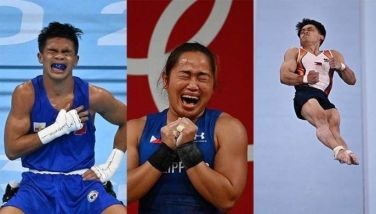How universal?

A few days before the world marked the 60th anniversary of the Universal Declaration of Human Rights, members of the Philippine National Police (PNP) killed 12 suspected bank robbers in a car chase in Parañaque.
The killings would have merited a shrug from the public, plus the usual good riddance to the suspects, if the fatalities did not include four civilians who were caught in the crossfire, including a father and his seven-year-old daughter.
Yet criticism of the police operation has been relatively muted as the PNP trotted out reports linking the dead suspects to several bank robberies and the fatal shooting of three cops who had come to the aid of a man the group had robbed of P1 million.
Sympathy for the dead suspects weakened further as the PNP announced that three of those killed were former soldiers.
Relatives of the civilians caught in the crossfire, I’m sorry to say, may never find out who fired the guns that killed their loved ones, though it’s possible to match the slugs from the fatal wounds with firearms used in the encounter. Any investigation will have only one conclusion: the deadly shots were fired by the suspected robbers.
People in this country have a high tolerance for this type of law enforcement, and a high tolerance for collateral damage, unless their loved ones are among those killed in the process.
Because of the slow pace of justice, corruption in the criminal justice system and the likelihood that arrested crooks will escape, there are people who prefer these short cuts to law enforcement.
The same tolerance is seen in the public’s attitude toward counterinsurgency and counterterrorism.
* * *
The Universal Declaration of Human Rights was shaped by events during World War II, particularly one of the most atrocious violations of human rights, the Holocaust. The declaration was influenced by the Bill of Rights in countries such as the United States, England and France.
The rights specified in the universal declaration evolved from the so-called Four Freedoms adopted by the Allies during the War: freedom of speech and assembly, freedom from fear, and freedom from want.
We were among the countries that drew up the original declaration, and among the 48 that voted for its approval by the UN General Assembly, 60 years ago today.
These days it’s not just our desire for effective law enforcement that is testing our commitment to that declaration, but also the global war against terrorism. How much are we willing to pay for freedom from fear? Is the war in fact aggravating the atmosphere of fear?
The war on terror has vastly complicated adherence to the declaration. In this type of warfare, the enemy does not go by international rules. The enemy deliberately goes after civilian targets and deliberately violates rules on the conduct of war and treatment of enemy combatants. Security officials have asked how they should deal with an enemy that does not go by any rules and does not recognize any UN declaration or treaty.
There are also debates on whether certain individual liberties should be given up, deferred or limited in exchange for freedom from fear and want. There are continuing debates on the limits of freedom of speech or expression.
In our country where a popular revolution ended a dictatorship and restored democracy, there are ongoing debates on how much freedom we can handle.
Some individuals who have gained prominence in their fields are openly calling for more focus on promoting freedom from want, with certain curbs on the exercise of other freedoms.
These prominent individuals are frustrated that countries such as Singapore, whose founding leader espoused economic liberation first before civil liberties, have sprinted ahead of the Philippines in almost all aspects of national life.
In the Islamic world some countries have criticized the 60-year-old universal declaration, pointing out that it was heavily influenced by Judeo-Christian values with little consideration for Islamic beliefs.
In 2000, members of the Organization of Islamic Conference endorsed the Cairo Declaration on Human Rights, which provides that people have the “freedom and right to a dignified life in accordance with the Islamic Shari’ah.”
Human rights groups, for their part, are pushing for the inclusion of the right to refuse to kill in the universal declaration.
Should the universal declaration be dynamic, like a nation’s constitution, adopting to changing circumstances and different cultural sensitivities, or should the rights enumerated in it be considered the ideal, for all societies to strive to uphold?
The universal declaration, though adopted by many countries, is not legally binding. But it paves the way for foreign governments to put pressure on regimes that violate human rights.
Last year, pressure from the international community is credited for the dramatic plunge in the number of killings of militants and journalists in the Philippines. This year the number is once again on the rise, with eight journalists killed so far. Perhaps the government needs another reminder from the international community about its human rights record.
That kind of reminder would not have been possible without the Universal Declaration on Human Rights. It may be imperfect, but for the most part the declaration has been a boon to the cause of freedom worldwide.
- Latest
- Trending



























